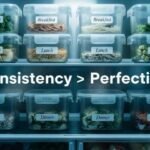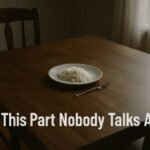When it comes to weight loss, everyone talks about motivation, discipline, and willpower — like those are the secret weapons separating the successful from the stuck.
But here’s the truth: willpower isn’t a strategy.
You can have the best intentions, nail your macros, and crush your workouts… but if your environment’s working against you, even the strongest mindset will crumble.
I used to think I just needed to “try harder.” But if willpower actually worked like that, I’d already be walking around with abs carved from granite. Instead, what I learned is that your environment is silently shaping your success — every single day.
👇 If you’d rather watch the video version, it’s right below 👇
When I Realised Willpower Wasn’t Enough
Back when I started dieting, I thought I could outsmart my cravings.
Every Monday I’d tell myself: This is the week I’ll stick to it. No cheat days, no slip-ups.
And by Friday? I’d be face-deep in snacks wondering what went wrong.
It wasn’t that I lacked motivation — it was that I’d built my environment to make failure easy. My cupboards were full of “just in case” treats, my fridge was a buffet of temptations, and every time I walked through the kitchen, I was testing my willpower.
Eventually, I realised something simple but life-changing: if it’s not in the house, it’s not in your mouth.
That one mindset shift did more for my progress than any diet hack ever could.
I’ve talked before about this kind of “environment design” in Dieting Doesn’t Work (Do This Instead), where I explained how I stopped relying on motivation entirely. The moment I started shaping my world instead of fighting it, the process got easier — almost automatic.
Your Home Environment: The Silent Saboteur (or Secret Weapon)
Let’s start where it all begins — your home.
If your kitchen’s full of biscuits, snacks, and “emergency treats,” I’ll bet they don’t stay there long. They’re like magnets for late-night cravings.
In my old carnivore days, I’d convince myself I was fine — until 10 p.m. rolled around and I was halfway through a jar of peanut butter with a spoon. (Yeah, we’ve all been there.)
Now? My kitchen looks like a minimalist’s dream — rice, lentils, fruit, and orange juice. Boring? Sure. But it also means I never have to fight myself at midnight.
This is how I think of it: your brain is lazy by design. If you make junk food hard to reach, you’ll stop eating it. If you make healthy food easy to grab, you’ll eat it without even thinking.
And if you live with people who eat differently? I get it — that’s tricky. The best thing I ever did was ask them to keep their snacks out of sight. Out of sight, out of mind genuinely works.
If you want more examples of how I simplify my environment to make dieting easy, I broke it all down in The Lazy Way to Get Leaner (That Actually Works). That one’s all about using systems to win, not just willpower.


The Social Environment: Protecting Your Progress
Now let’s talk about people.
We’ve all got that one friend who insists “one slice won’t hurt.” And yeah, one slice doesn’t hurt — but one slice here, one takeaway there, and suddenly the scale’s creeping up.
Here’s the thing: most people mean well. But your goals aren’t their goals.
When I first started eating high-carb, low-fat, I brought my own food everywhere.
Back when I was carnivore, it was beef and eggs. Now it’s rice, lentils, and fruit.
Do I get weird looks? Sometimes. But I’d rather get weird looks than lose my progress.
And let’s be honest — people aren’t really paying that much attention. They’re more worried about what they’re eating than what’s on your plate.
Protecting your environment doesn’t mean cutting people off. It means protecting your focus.
If someone’s always pushing junk food, learn to say “no thanks” without guilt.
That one small boundary keeps you in control — and trust me, the people who matter will respect it.
The Habit Environment: Make the Healthy Choice Easy
This one’s all about structure.
Every single thing we do is shaped by cues — what we see, what we touch, what we repeat.
If you want to start exercising, make it obvious. I literally put my trainers where I trip over them in the morning. If I can’t ignore them, I can’t skip the workout.
Same goes for food. I keep a big water bottle on my desk so I drink automatically. I prep rice in bulk so meals are ready without decision fatigue.
The goal isn’t perfection. It’s removing friction — making the healthy choice easier than the unhealthy one.
And when you nail that balance, willpower becomes almost irrelevant.
That’s one of the biggest mindset shifts that helped me return to the gym after two years off — something I shared in Getting in Shape After 40 (Starting from Scratch). It’s not about intensity; it’s about making showing up easier than skipping.
The Mental Environment: What You Feed Your Mind
Let’s be real — what’s happening in your head matters more than what’s happening in your fridge.
If your social feed is full of shredded physiques and “grind harder” quotes, you’re going to feel like you’re failing. That stuff chips away at you, slowly but surely.
I used to follow everyone — keto gurus, fitness influencers, extreme bodybuilders — and it just made me miserable. Because I wasn’t them.
So now, I curate my feed. I follow creators and communities that motivate me in a realistic way — people who are honest about the ups and downs, not just the highlight reel.
You are constantly feeding your mind something. If it’s not encouraging you, it’s draining you.
That’s why I spend time every week watching videos that recharge me — not ones that make me feel behind. (Yes, cat videos count.)
Because what you focus on shapes what you do.
The Real Reason Willpower Fails
Most people think willpower fails because they’re weak.
No — it fails because it’s not supposed to last.
Willpower is like your phone battery. Every time you resist something, you use a little more charge. By the end of the day, you’re running on fumes.
That’s why you cave after dinner, not at breakfast. You’ve simply used up your mental energy.
The trick isn’t to get better at resisting — it’s to design your day so you don’t have to resist as much in the first place.
You can’t fight the environment forever. But you can build one that fights for you.


My Takeaway: Build Systems, Not Struggles
Here’s what I know now — the easiest plan is the one you’ll actually follow.
That’s why this high-carb, low-fat, rice-based way of eating works for me. My cupboards are simple, my routine is predictable, and my environment keeps me on track automatically.
No temptation, no battles, no constant decision-making.
And on the days where I do mess up? I don’t spiral anymore. I tweak my setup instead of blaming my willpower.
Because the truth is, most of us don’t fail because we’re lazy — we fail because we’re surrounded by triggers that make success harder than it needs to be.
Once you flip that, the game changes.
If you’re curious how I built those habits from scratch, you’ll probably like The Rules I Follow to Lose 100 Pounds — that one breaks down how I turned discipline into autopilot.
Final Thoughts
At the end of the day, your environment is always shaping you.
Every choice gets easier or harder depending on what surrounds you — from what’s in your cupboard to who’s in your circle to what’s on your feed.
You don’t need to be perfect. You just need to make it easier for yourself to win more often than you lose.
So if you’ve been grinding it out on sheer willpower, wondering why it feels impossible — maybe it’s not you.
Maybe it’s your environment.
Change that, and everything else starts lining up.



